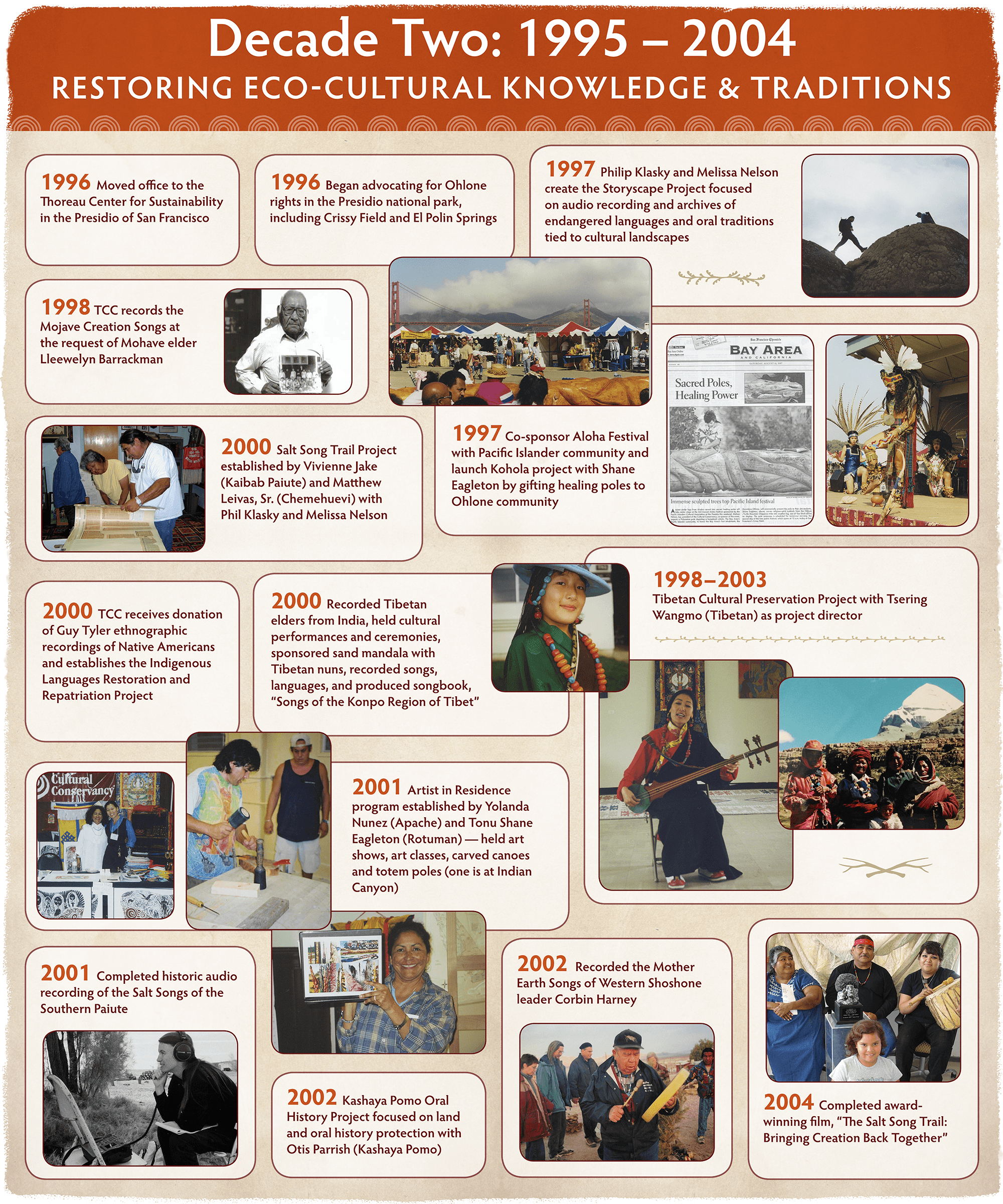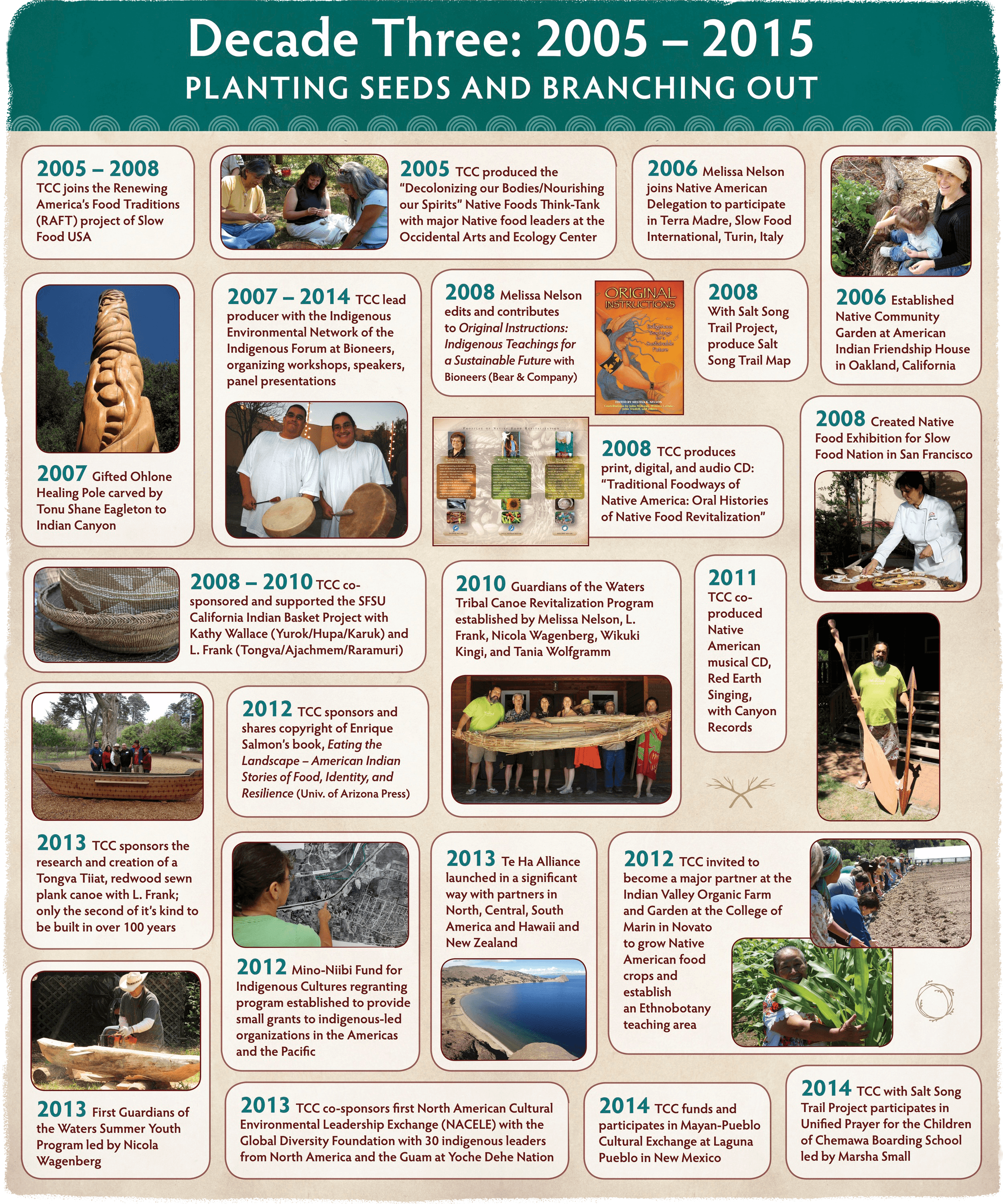Milestones in Cultural Revitalization
Historical Projects and Accomplishments
in our first 30 Years: 1985-2015
Protecting Ancestral Lands
Through land acquisition support, cultural conservation easements, and conservation partnerships, TCC has protected sacred sites of the Wintu on Mount Shasta in northern California; traditional lands for the Kogi people of Colombia; a rare and endangered California Indian native plant gathering site in Santa Rosa, California; helped create Hui Aina o Hana, a Native Hawaiian land trust on Maui, and mediated between Ohlone tribal groups and the National Park Service to develop an agreement to protect urban water resources, native plant communities, and California Indian cultural resources in the Presidio National Park. We have also consulted with the Xavante Indians of Central Brazil to protect their ancestral lands, hunting territory and culture from the proposal to build a Hidrovía (industrial waterway) for the purpose of resource extraction. We have also supported the sacred site preservation efforts of groups to protect Ward Valley, the Mystic Maze, and Kashaya Pomo lands in California and the San Francisco Peaks, Black Mesa, and Mount Graham in Arizona. TCC has been a regional leader in California assisting tribes and nonfederally recognized California Indian communities in land access and protection including concern for shellmound burial sites in coastal California and native plant gathering sites throughout the state.
Revitalizing Traditional Knowledge
Through community-based ethnography, research, documentation, and media distribution, TCC has assisted with the restoration of the Mojave Creation Songs and the Southern Paiute Salt Songs; preserved Yup'ik Indian midwifery knowledge in Alaska; repatriated over 600 legacy recordings of endangered languages to over fifty Tribes throughout the US. We worked closely with the Tibetan community living in the San Francisco Bay Area and brought over a dozen Tibetan elders from India to perform and record. We recorded the traditional songs and dances of the Kongpo region of Tibet in a Songbook and in videos. We have conducted dozens of oral history interviews and media trainings with California Indian Tribes, Pueblo communities in the Southwest, Pacific Islander storytellers, and mixed urban Indian communities seeking to restore traditional knowledge.
Tribal Training and Capacity-Building
We have completed community workshops and trainings for Hawaiian members of Ka Lahui Hawai'i and Hui Aina o Hana and California Indian basket weavers in native land trusts and resource management; members of the National Park Service and Society for Ecological Restoration in protecting and restoring ecological and cultural resources together; members of the Southern California Tribal Digital Village and Southern Paiute Tribes in audio and video recording and digital storytelling.
Media Productions
In 2004, we produced the award-winning documentary film, The Salt Song Trail: Bringing Creation Back Together, which won two awards and was shown at film festivals, museums, and Indian events across the US and Canada. We also produced a CD Songscapes of Native America featuring Native American traditional and contemporary music; and in 2002 completed the PBS inter-active web site, “Circle Of Stories” about Native American storytelling. In 2009 we completed Salt Song Trail – A Living Documentary, a DVD featuring two short films, “The Old Woman Mountains” and “Stewart Indian Boarding School,” edited by Chemehuevi filmmakers-in-training Cara McCoy and Bridget Sandate. These two documentary shorts were shown at Indian film festivals in 2009-10. We also completed a “Salt Song Trail Map of Nuwuvi (Southern Paiute) Sacred Landscapes, Culture Areas and Bands,” featuring the one thousand mile Salt Song trail that travels through a variety of native landscapes and ecosystems. In 2010 we released a collaborative educational DVD, Circle of Stories, with Philomath Films based on our PBS web site.
Public Education / Public Art Exhibits
TCC has conducted hundreds of public education events ranging from Indigenous lectures, art shows, cultural demonstrations, and traditional food tastings, to American Indian musical concerts and Tibetan sand mandala ceremonies. Most of our public events and fundraisers feature indigenous artists work in painting, sculpture, woodcarving, multimedia and music. TCC staff regularly makes presentations at Indigenous, environmental, and educational conferences locally, nationally, and internationally including the Indigenous Environmental Network’s Protecting Mother Earth Conferences, the Bioneers Conferences, the Society for Ethnobiology, Society of Ecological Restoration, Native American Land Conservancy, California Indian Conference, Terra Madre, World Indigenous Peoples Conference on Education, and others. With Bioneers and the Indigenous Environmental Network, TCC co-produced the Indigenous Forum at Bioneers from 2003 through 2014. At this forum over 30 Native leaders share their work with over 3,000 participants.
Restoring Indigenous Health and Food Systems
TCC recognizes the profound relationship between the health of the land, waters, food, and people. In 2003 and 2005 we held two Native Health/Native Foods think-tank retreats with Native doctors, healers, farmers, and food advocates from across the country. We developed a strategic network of the growing Native foods movement. TCC also served as a regional leader helping to establish Slow Food USA’s RAFT project in the Southwest and California. RAFT, Restoring America’s Food Traditions, aimed at the restoration and revitalization of food traditions that reflect agrobiocultural diversity across North America. In 2006 members of TCC participated in the Native American Delegation to Terra Madre in Turin, Italy. In 2008 TCC hosted and served as the exhibition producer and curator for the Native Food Pavilion at Slow Food Nation in San Francisco. During these projects, TCC conducted over 30 interviews with Native Americans leaders in the Native food movement. In 2007 TCC partnered with the American Indian Friendship House to create a beautiful urban garden pilot project in Oakland, California with Native American traditional foods, herbs, and medicines. Native American women in recovery and their children were able to use the garden. We provided numerous workshops to this community on Native cooking, nutrition, weeding, and mental health with Native leaders Lois Ellen Frank, Ed Mendoza, L. Frank, and Winona LaDuke.
Image Credits:
Photos by Melissa K. Nelson, Nícola Wagenberg
Poster Designs by Diane Rigoli







